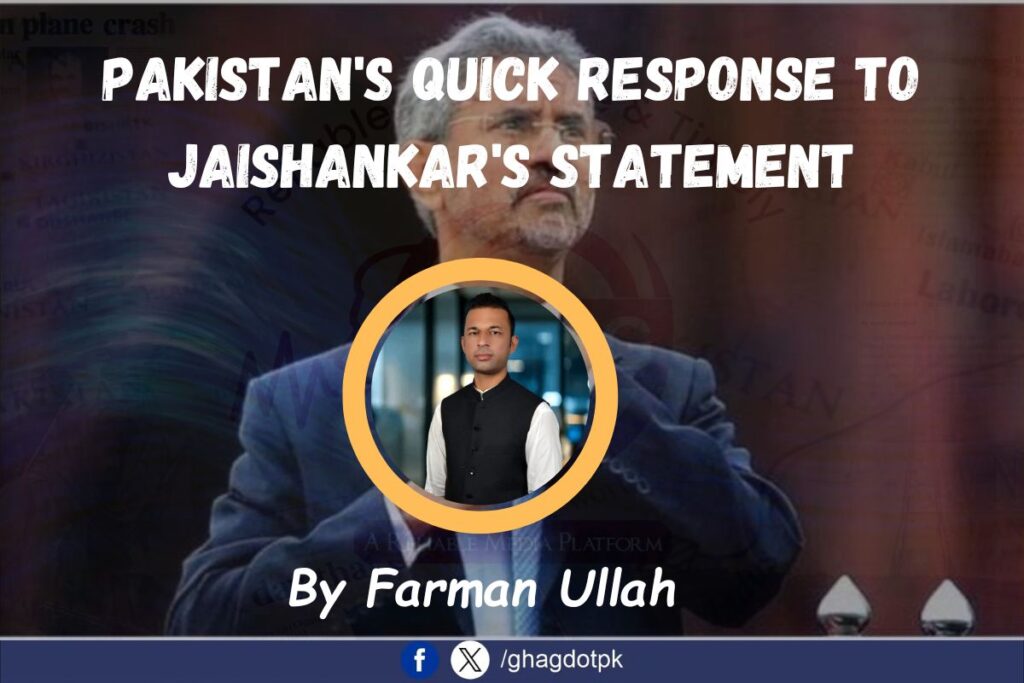By Farman Ullah
The Kashmir dispute is a longstanding issue between India and Pakistan, with both countries claiming sovereignty over the region. The conflict began in 1947, after the partition of India.
When the Hindu ruler of Jammu and Kashmir, Maharaja Hari Singh, decided to join India, it sparked controversy. This decision was made despite the state’s majority Muslim population.
Jaishankar’s Recent Statement
India’s recent statement, made by External Affairs Minister Dr. Subrahmanyam Jaishankar, has sparked widespread concern and condemnation from Pakistan and the international community. By telling Pakistan to “vacate” Azad Jammu & Kashmir (AJK), which India refers to as “stolen” territory, Jaishankar’s remarks have been perceived as a blatant attempt to undermine Pakistan’s sovereignty and territorial integrity. This statement is not only a clear violation of the Simla Agreement and brazen disregard for the United Nations Security Council resolutions, which recognize the Kashmir dispute as an international issue that needs to be resolved through peaceful means. Furthermore, Jaishankar’s statement has been seen as a deliberate attempt to escalate tensions between the two nuclear-armed neighbors, and to divert attention from India’s own human rights abuses and suppression of dissent in Indian-administered Kashmir. The statement has also been criticized for its hegemonic tone, which reflects India’s growing tendency to adopt a unilateral and aggressive approach to regional issues, rather than engaging in meaningful dialogue and diplomacy. Overall, India’s recent statement has set off alarm bells in the region, and has underscored the need for urgent and sustained efforts to resolve the Kashmir dispute through peaceful and diplomatic means.
Pakistan’s Response
Pakistan swiftly rejected India’s claims, with the Foreign Office spokesperson stating that Dr. Jaishankar’s remarks were “misleading” and contrary to international law. Pakistan emphasized that the Kashmir dispute remains unresolved and must be settled through an independent plebiscite, allowing the people of Jammu & Kashmir to decide their future. Pakistan also reiterated its call for talks with India to normalize relations, urging India to vacate the “illegally occupied” Jammu and Kashmir territory, and reminding the international community of its responsibility to ensure implementation of UN Security Council resolutions on the dispute.
The Need for Resolution
Pakistan has repeatedly called for talks with India to normalize relations before addressing the dispute. The international community should remind India that its leadership has threatened to invade Pakistan and has conducted military operations in AJK.
The Threat to Regional Peace
The unresolved Kashmir dispute poses a significant and persistent threat to regional peace and stability, with far-reaching implications for the security and well-being of millions of people in the region. The tensions between India and Pakistan, both nuclear-armed nations, have led to numerous skirmishes and clashes along the Line of Control (LoC), resulting in loss of life, displacement of civilians, and damage to infrastructure. Furthermore, the dispute has also fueled extremist and militant movements, which have exploited the tensions to perpetuate violence and terrorism, not only in Kashmir but also in other parts of the region. The international community has repeatedly expressed concern over the potential for the dispute to escalate into a full-scale conflict, which would have catastrophic consequences for the region and beyond. Therefore, it is imperative that India and Pakistan engage in meaningful and sustained dialogue to resolve the dispute peacefully, taking into account the aspirations and rights of the Kashmiri people, and that the international community plays a supportive role in promoting a peaceful resolution to this longstanding and volatile dispute.






